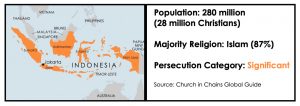
The Republic of Indonesia is a vast country made up of over 17,000 islands (6,000 inhabited) and has the world’s largest Muslim population. It is ethnically diverse, with hundreds of local languages spoken as well as Indonesian, and has earned a reputation for pluralism and inter-religious harmony, reflected in Pancasila, the state philosophy of unity, justice and democracy. This reputation is being undermined by radical Islam’s growing influence on politics and society.
A Dutch colony from 1605, Indonesia was occupied by Japan during WW2. The nationalist leader Sukarno declared independence in 1945 and the Dutch transferred sovereignty in 1949, after an armed struggle.
Sukarno’s successor General Suharto, who came to power in 1968, imposed an authoritarian regime and increased the role of Islam in public life. He fell from power after riots in 1998 and Indonesia transitioned to democracy. Improved security, political stability and economic growth followed.
Christians welcomed the election of President Joko Widodo in 2014 as he promised equal rights for religious minorities and promised new laws to protect them from attack and discrimination, but corruption and ethnic and religious conflict persisted. The February 2024 presidential elections were won by former general Prabowo Subianto, the son-in-law of former president General Suharto, and he was sworn into office on 20 October 2024.
Militant Islamic groups have grown in strength in recent years, some linked to al-Qaeda and some to Islamic State, and the spread of extremist Muslim ideology has led to increasing intolerance. A number of high-profile “blasphemy” cases have led to a polarisation in society, to the detriment of religious minorities including Ahmadis, Buddhists, Christians and Shia Muslims.
Christians in Indonesia
Indonesia’s constitution guarantees freedom of religion and the national laws uphold religious freedom, but while many Christians are free to practise their faith they face problems in some states, especially the semi-autonomous province of Aceh, which is governed by Sharia, and West Java, Jakarta and Sulawesi provinces, where Sharia-inspired laws have been passed and are often given precedence over national laws by local leaders. Converts from Islam face persecution and applications for permits to establish churches are increasingly being denied.
Hundreds of churches have been closed in recent years under discriminatory government regulations. The “religious harmony” law passed in 2006, which governs applications for permits to establish and operate places of worship, stipulates onerous conditions including obtaining the approval of at least sixty people from the local community and the village head, and having at least ninety church members. These conditions are difficult for small churches to meet and permission is sometimes denied or withdrawn after complaints from local Muslims. In the decade following the passing of the law, over 1,000 churches were closed.
Intolerance toward religious minorities has intensified since 2010, with many church buildings violently attacked and torched and several bombed – notably three church bombings in East Java in 2018 that killed 13 people and the Palm Sunday bombing in South Sulawesi in 2021 that injured at least twenty people. These bombings were carried out by Jemaah Ansharut Daulah, an Indonesian militant network that has pledged allegiance to Islamic State. Terrorists from the Eastern Indonesia Mujahideen murdered four Christians in 2020 and four more in 2021, all in Central Sulawesi province. There have also been many deadly attacks on minority Muslim sects, notably Ahmadis.
(Barnabas Fund, Church in Chains Global Guide, Human Rights Watch, World Watch List, Voice of the Martyrs Canada)
